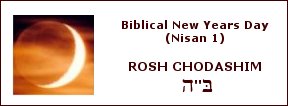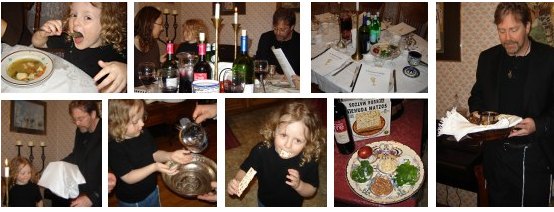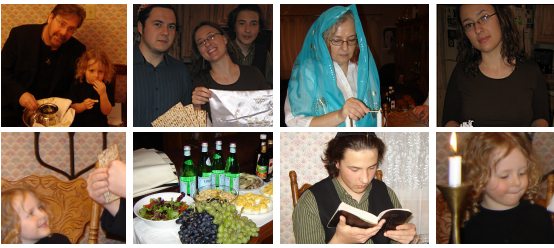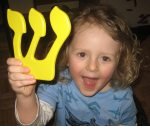|
|
|||||||||||||||||||||
 |
|||||||||||||||||||||
|
Learn Hebrew |
|||||||||||||||||||||
 |
|||||||||||||||||||||
|
Learn Torah |
|||||||||||||||||||||
|
April 2008 Updates
Parashat Kedoshim - פרשת קדשים 4.27.08 The weekly Torah portion for this coming Shabbat is Kedoshim ("holy ones") and concerns the call for the followers of the LORD God of Israel to become holy themselves.  In Hebrew, the word kedushah (from the root k-d-sh) means sanctity or "set-apartness" (other Hebrew words that use this root include kadosh (holy), Kiddush (sanctifying the wine), Kaddish (sanctifying the Name), kiddushin (the ring ceremony at a marriage), and so on). Kadosh connotes the sphere of the sacred that is radically separate from all that is sinful and profane. As such, it is lofty and elevated (Isa. 57:15), beyond all comparison and utterly unique (Isa. 40:25), entirely righteous (Isa. 5:16), glorious and awesome (Psalm 99:3), full of light and power (Isa. 10:7), and is chosen and favored as God's own (Ezek. 22:26). Indeed, holiness is a synonym for the LORD Himself (Hakadosh barukh hu - The Holy One, blessed be He). The phrase v'ahavta l're'akha kamokha is considered the most comprehensive rule of conduct toward others found in the entire Torah. Thus Hillel, a contemporary of the Lord Jesus, commented regarding this phrase: "That which is hateful to you, do not do to your neighbor. That is the whole Torah; the rest is commentary." The Lord Jesus said "all things whatsoever ye would that men should do to you, do ye even so to them: for this is the law and the prophets" (Matt 7:12). The apostle Paul also wrote "Love worketh no ill to his neighbor: therefore love is the fulfilling of the law" (see Rom. 13:10, Gal. 5:14). Book Project Update 04.26.08 It's been a grueling process, but the new book is nearly complete! I will provide you with more details shortly. Thank you all for your prayers for this work, chaverim! 
New Hebrew Mediation: Living Transparently 4.24.08 I wrote a new Hebrew mediation (Living Transparently) based on Deuteronomy 18:13: "You shall be wholehearted (tamim) with the LORD your God." I hope you find it helpful, chaverim.  Something I find fascinating is the psychological phenomenon sometimes referred to as a "Gestalt Shift," a perceptual transformation that suddenly unveils new understanding. A classic example is the chalice/face drawing (shown below). In order to see the faces (or the chalice), we must choose our background which then transforms our frame of reference: People live in despair because they are often double-minded. Consciously or not, they are attempting to look at two different things at once. When it comes to matters of ultimate concern, however, we cannot vacillate in our perception without risk of spiritual dissolution.
Happy Passover, chaverim!
From right to left: 1) John carrying urchatz; [top]: 2) the seder table; 3) reading the haggadah; 4) Josiah eating matzah ball soup; [bottom]: 1) the seder plate; 2) Josiah eating matzah; 3) Josiah washing hands; 4) John bringing out the matzah tosh.
From right to left: [top]: 1) beloved Olga; 2) Irina lights the Pesach candles; 3) getting the matzah ready; 4) John and Josiah; [bottom]: 1) Josiah; 2) Reading the 4 questions; 3) even more food; 4) Josiah watches the the Breaking the Matzah (Afikomen). LE'SHANAH HABA'AH BI'YIRUSHALAIM" - "Next year in Jerusalem", halevai. Wishing you all Chag Sameach and joy, chaverim. Pirkei Avot and the Omer שמעון הצדיק היה משיירי אנשי כנסת הגדולה. הוא היה אומר, על שלושה דברים העולם עומד--על התורה, ועל העבודה, ועל גמילות החסדים Shimon the Righteous was among the last surviving members of the Great assembly. He would say: On three things does the world stand: on the Torah, on the service to G-d, and on deeds of kindness. (Avot 1:2) Gemilut Chasadim are acts of chesed (love, kindness) that include giving tzedakah (charity), bikkur cholim (visiting the sick), tikkun olam (repairing the world), and many other ways of helping others. Taking Passover Personally 4.17.08 It's not enough to recall, in some abstract sense, the deliverance of the Jewish people in ancient Egypt, but each Jew is responsible to personally view Passover as a time to commemorate their own personal deliverance as well. Therefore the sages teach: B'khol-dor vador:  B'khol-dor vador chayav adam lirot et-atzmo k'ilu hu yatza mi-mitzrayim - in each and every generation an individual should look upon him or herself as if he or she (personally) had left Egypt. The 17th of Nisan 4.16.08 Passover is Nisan 15th, which this year begins Saturday April 19th (at sundown). The resurrection of Yeshua occurred on Nisan 17, which this year occurs sometime before dawn Tuesday, April 22. The Babylonian Talmud (Tractate Rosh HaShana 11a) states that "In Nisan our forefathers were redeemed from Egypt and in Nisan we will be redeemed." Nisan is also the month assigned to the tribe of Judah (from which tribe Yeshua came). Other events that occurred on this date are:
Inspecting the Passover Lamb 4.15.08 Today is Nisan 10 on the Jewish Calendar, the date when Yeshua rode into Jerusalem upon a lowly donkey just a few days before His crucifixion (Matt. 21:1-16). The Holy City would have been a busy place, bustling with excitement and (due to Roman oppression) filled with Messianic expectation. Countless Jews would have streamed in from around the world to observe the Passover with their extended families. The Law required (Ex. 12:1-6) that each family select a lamb (called korban Pesach) four days before the sacrifice was to be offered at the Temple. During this time the lamb would be examined to ensure that it was defect-free and therefore acceptable for sacrifice at the Temple. Note that when Yeshua first entered the city, He was greeted by the cries of Jewish Passover pilgrims: "Hosanna!" This word is actually the phrase "hoshiah na" (הוֹשִׁיעָה נָּא), meaning "please save" or "save now." The Jewish pilgrims were actually singing from Psalm 118:25-26 and applying it to the greater Son of David, Yeshua, who was now in their midst:  Matthew notes that hoshiah na was addressed to Yeshua Himself, "to the son of David" Upon entering Jerusalem, Yeshua immediately went to the Temple and drove out all who sold there, overturning the tables of the "moneychangers" and the seats of those who sold pigeons (Matt. 21:12). There were actually TWO separate cleansings of the Temple recorded in the New Testament. The earlier cleansing is described in John 2:13-22 and the later one is described in (both) Mark 11:15-19 and Matthew 21:1-16. In Mark's account of the second cleansing, Yeshua actually stopped the "carrying of the ritual vessels" -- meaning He LITERALLY stopped the sacrifices of Israel. Mark 11:16 states: "And he would not suffer that any man should carry any vessel through the Temple." Despite performing miraculous works of healing in the Temple that day -- including opening the eyes of the blind and causing the disabled to walk -- the kohanim (chief priests) and soferim (scribes) were "indignant" at His actions and therefore sought to put Him to death (Mark 11:18). "O Jerusalem, Jerusalem, the city that kills the prophets and stones those who are sent to it! How often would I have gathered your children together as a hen gathers her brood under her wings, and you would not! See, your house is left to you desolate. For I tell you, you will not see me again, until you say, 'Blessed is he who comes in the name of the Lord.'" And Jesus went out, and departed from the Temple (Matt. 23:37-24:1). In Matthew 24 Yeshua's disciples made a last-ditch appeal for Jewish tradition and ceremony by pointing out the glory of the Second Temple. "Look at these beautiful buildings of the Temple, Lord..." It was then that Yeshua pronounced judgment on the Temple and the Levitical system, predicted the Roman destruction of the Temple, and so on. This was apparently unfathomable to the disciples, who apparently still considered Yeshua to be a "reformer" of Temple Judaism, perhaps the one who would restore it so that the Kingdom of God would be finally manifest upon the earth.... Yeshua went on to explain the signs of the End of the Age (אַחֲרִית הַיָּמִים) that would precede the promised Days of Messiah (יְמֵי הַמָּשִׁיחַ), otherwise known as the Messianic Kingdom. He foretold that one day praise would rightly be given to Him as Israel's True King, but only after the travail of the coming Great Tribulation upon the earth. Only after the Jewish people cry out to Him as their LORD (Matt. 23:39) would the Kingdom of God be established in Zion. A Note about the Jewish Hour (sha'ah) The Cross of Yeshua is the true Holy of Holies where God Himself offered His Son as the Lamb of God who takes away the sins of the world... It is there that He made agonizing intercession for us -- the Just for the unjust -- so that we are spared from God's wrath and eternally reconciled to Him. Just as the original Passover foreshadowed God's deliverance of His people from Egypt and slavery, so the Passover of Yeshua represents God's deliverance of us all from the power and slavery to sin. It is through His substitionary death combined with our faith in His love for us that we are imputed righteousness before God Himself (2 Cor. 5:21). For this Passover season, let us all say, "Blessed is He (Yeshua) who comes in the Name of the LORD!" Amen.
Dates of the Passover Season 4.10.08 Technically speaking, Passover (Pesach) is a one day holiday that recalls the deliverance of the LORD by means of the blood of lambs immediately followed by the seven day Feast of Unleavened Bread (Chag HaMatzot). Modern Judaism, however, combines both of these into an eight day holiday that begins on the 14th of Nisan and ends after sundown on the 22nd of Nisan. This year (5768) Pesach starts Saturday April 19 at sundown and ends Sunday April 27th at sundown (in Israel Passover lasts for seven days, not eight). The first and last two days of Passover are Sabbaths when no work (melakhah) is permitted. The intermediate days (days 3-6) are called Chol HaMo'ed and only essential work is permitted. In the Diaspora, the Passover Seder takes place on the the first two nights of the festival, though in Israel there is only one Seder, on Nisan 14. The Passover Lamb, called korban Pesach (קרבן פסח), is the central focus of this holiday. Without the lamb, there literally is no Passover... After the destruction of the Temple, however, Rabbinical Judaism developed the Seder as a ceremonial replacement for the Torah's commandment to eat the sacrificed lamb (actually, lamb is one of the foods traditionally not eaten during a modern Seder, though the ze'roa, or roasted shank bone, is included as a reminder of its importance). The Rabbis developed fifteen distinct steps in the traditional Seder (which you can learn about here).  Passover is the only festival that the LORD made special provision so that if someone missed the occasion (on account of illness, ritual impurity, or some other valid reason), he or she could make it up 30 days later on Iyyar 14 (Num. 9:9-12). This is called Pesach Sheni. God wants His children to observe this festival, chaverim... The Shabbat before Pesach is called Shabbat HaGadol (the Great Shabbat) because it was the day when the Jewish people miraculously took sheep (which were considered sacred to the Egyptians) for the Passover Lamb to be sacrificed four days later. This year Shabbat HaGadol occurs on April 19th (the same day as Passover itself). For more information about Passover, please see the Passover Pages, starting here. Parashat Metzora - פרשת מצרע 4.07.08 I updated the Torah portion for this coming Shabbat (Metzora).  How was it that Yeshua was able to touch the metzora ("leper") and yet remain clean (Matt 8:1-4)? Only because He Himself is the LORD, the Healer. Just as Yeshua spoke with greater authority than Moses (Matt 5:21-48), so He was able to do what Moses (and those under the Levitical system of worship) could not do -- namely, reach down in compassion and take away the uncleanness from our lives.... Only Yeshua enters the "leper colony" of humanity and takes away our tzara'at (sin) by becoming ish machovot - a Leper Himself, the Just for the Unjust, that He might make us acceptable before the LORD: Isaiah 53:1 Who hath believed our report? and to whom is the arm of the LORD revealed? 2 For he shall grow up before him as a tender plant, and as a root out of a dry ground: he hath no form nor comeliness; and when we shall see him, there is no beauty that we should desire him. 3 He is despised and rejected of men; a man of sorrows, and acquainted with grief: and we hid as it were our faces from him; he was despised, and we esteemed him not. 4 Surely he hath borne our griefs, and carried our sorrows: yet we did esteem him stricken, smitten of God, and afflicted. 5 But he was wounded for our transgressions, he was bruised for our iniquities: the chastisement of our peace was upon him; and with his stripes we are healed. 6 All we like sheep have gone astray; we have turned every one to his own way; and the LORD hath laid on him the iniquity of us all. 7 He was oppressed, and he was afflicted, yet he opened not his mouth: he is brought as a lamb to the slaughter, and as a sheep before her shearers is dumb, so he openeth not his mouth. 8 He was taken from prison and from judgment: and who shall declare his generation? for he was cut off out of the land of the living: for the transgression of my people was he stricken. 9 And he made his grave with the wicked, and with the rich in his death; because he had done no violence, neither was any deceit in his mouth. 10 Yet it pleased the LORD to bruise him; he hath put him to grief: when thou shalt make his soul an offering for sin, he shall see his seed, he shall prolong his days, and the pleasure of the LORD shall prosper in his hand. 11 He shall see of the travail of his soul, and shall be satisfied: by his knowledge shall my righteous servant justify many; for he shall bear their iniquities. 12 Therefore will I divide him a portion with the great, and he shall divide the spoil with the strong; because he hath poured out his soul unto death: and he was numbered with the transgressors; and he bare the sin of many, and made intercession for the transgressors.
Spiritual Warfare 4.06.08 Shalom Chaverim... I have been experiencing some pretty rough attacks from the evil one lately and ask you to offer up a prayer. I am also struggling with physical pain. Self-Examination and Passover 4.03.08 Shalom Chaverim... This is just a personal note to let you know that I have been feeling somewhat weary lately. The "synchronicity" issue I wrote about (see below) might be behind some of this. Though we are indeed "eager to keep the feast" of Passover this year (1 Cor. 5:7-8), many good Christian friends have already celebrated "Easter" a couple weeks ago and that sadly creates a sense of "disconnect" for us.... We yearn for the day when we are all united in the truth of Yeshua our Mashiach. Maran Atah!  Notice that this passage (1 Cor. 5:7-8) also commands us to perform our own bedikat chametz - or search for leaven in our lives... We are called to become a "new lump," that is, a new substance that is untainted by the sour and rotting influences of our past lives. Since the Mashiach has been sacrificed as our Passover Lamb, we are new creations, made "unleavened" by the power of the Holy Spirit. Therefore we are told to "put away" the old nature - the yetzer ha'ra (evil inclination) - and purge the old influences that inwardly canker and make us sick. In other words, since we are now "new dough" made free from the corrupting power of sin by the grace of God, we should be on guard not to allow the secretive influences of "leaven" back into our lives. (A little leaven leavens the whole lump.) We are made holy and clean by the sacrifice of the true Lamb of God Himself and our lives should reflect that truth... May God help us all walk without hypocrisy in our lives. Amen.
The Biblical New Year - and Passover 4.01.08 This Saturday (at sundown) marks the Hebrew date of Nisan 1 (called Rosh Chodesh Nisan), which recalls the start of the Exodus from Egypt and the beginning of Jewish national history. Rosh Chodesh Nisan is the first day of the first month of the Hebrew Calendar (i.e., Biblical New Year's Day) and a time to begin preparing for Passover (the Seder begins Saturday, April 19th at sundown this year). In addition to the regular Torah reading, Exodus 12 (concerning the "beginning of months") is read and Ezekiel 45 is recited as Haftarah.  I also updated the weekly Torah portion for this coming Shabbat (Tazria) and also updated the PDF file. Starting next week, most Orthodox Jews will begin (in earnest) the arduous process of preparing their homes for Passover. All chametz (yeast) must go!
|
||||||||||||||||||||||||||||||||
|
Hebrew for Christians |
||||||||||||||||||||||||||||||||
|
||||||||||||||||||||||||||||||||















